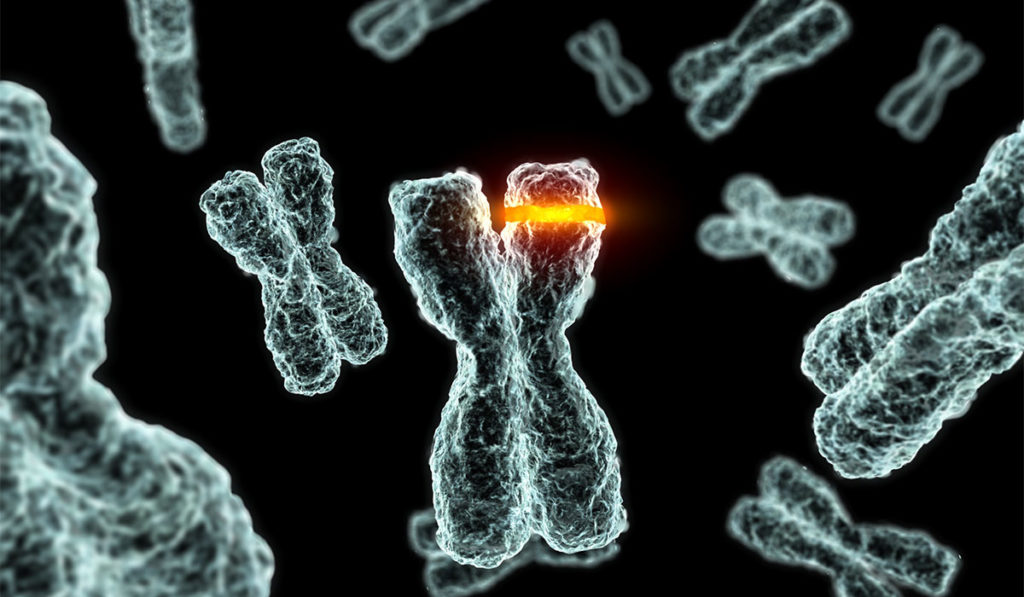In 2007, the first genomewide association study of prostate cancer identified a locus on chromosome 8 (8q24) as having significant association with the disease. Now, research published in Nature Communications reveals that about nine percent of prostate cancer heritability can be explained by variation within the 8q24 genomic locus.
“We’ve taken a comprehensive approach to investigate data at this chromosome location and have been able to construct how it contributes to risk, including which of the haplotypes impact the age of onset and also aggressiveness,” said Jeffrey Smith, M.D., senior author on the study and an associate professor in the Department of Medicine at Vanderbilt University Medical Center. Coauthors on the study include William Dupont, Ph.D., Sam Chang, M.D., and Joseph Smith, M.D.
The researchers reconstructed ancestral DNA fragments (haplotypes) of this region that, when inherited, carry strong risk of prostate cancer. They also identified the select genetic variants of these haplotypes that are predictive of prostate cancer risk, suggesting they may be appropriate for inclusion in hereditary cancer testing panels.
Familial Clustering and Heritable Risk
For breast and ovarian cancer, the identification of heritable risk attributable to BRCA1 and BRCA2 has had a broad impact on etiological understanding and patient care. While familial clustering is also observed for prostate cancer, understanding heritable prostate cancer risk has proven to be much more complex.
“Prostate cancer has the greatest heritable risk of all common cancers, roughly twice that of breast cancer. But the genetic origins of familial prostate cancer are also more heterogeneous, differing between families, and even among affected men within the same family,” Smith said.
“The genetic origins of familial prostate cancer are…more heterogeneous [than breast cancer], differing between families, and even among affected men within the same family.”
An analysis of only 23 pedigrees was sufficient to detect the BRCA1 locus, yet similar analyses of a far greater number of pedigrees meeting criteria for hereditary prostate cancer (HPC) yielded less prominent loci. HOXB13 was successfully identified as a causal gene for prostate cancer but accounts for only about four percent of HPC cases.
“The etiologic spectrum could include a burden of numerous common low-risk polymorphisms, less common intermediate-risk variants, or diverse and rare high-risk mutations,” the authors wrote. “A given family may segregate any combination of these.”
Identifying Risk Variants
To identify familial prostate cancer risk variants at 8q24, the researchers analyzed the Nashville Familial Prostate Cancer Study, an investigation comparing men with prostate cancer, each from a separate family with a strong history of the disease, to screened men without a personal or family history of prostate cancer. Data from a separate, even larger study of HPC by the International Consortium for Prostate Cancer Genetics confirmed observations.
In total, 433 variants comprising seven haplotypes were identified as being associated with HPC. Variants that had not previously been reported were among 183 variants reaching genomewide significance.
Whole-genome sequencing revealed the mutation candidates of a near-Mendelian haplotype, carrying up to a 22-fold increased risk of prostate cancer. A separate, more common haplotype carried a five-fold increased risk, particularly for early-onset disease. Other haplotypes were instead associated with a reduced risk of prostate cancer and were also associated with later-onset and less aggressive disease.
Hereditary Cancer Panels
Panel-based screening for hereditary cancer includes HOXB13. The authors state that the near-Mendelian 8q24 haplotype could be considered for inclusion in screening panels as well, as this haplotype was found to have a frequency and risk effect similar to HOXB13 G84E.
“This study introduced several new approaches that have proven effective in this setting, identifying high-risk alleles at 8q24 responsible for the familial clustering of prostate cancer. Some of these alleles also underlie heterogeneity of clinical presentation,” Smith said.
“We hope to expand the use of these approaches to better understand the underlying causes of familial prostate cancer, enabling prediction of disease risk and course. Both 8q24 and HOXB13 are unambiguous successes along this path.”
“We hope to expand use of these approaches to better understand the underlying causes of familial prostate cancer, enabling prediction of disease risk and course.”





